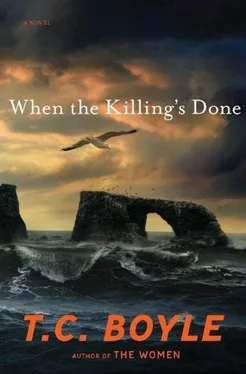She has an impulse to pick up the sneakers, to touch them, lift them to her face, but she can’t. Her legs go weak on her and she has to sit down right there where she is, on the corner of the bed. She folds her arms across her breasts and holds tight to her shoulders. She can’t seem to lift her head. After a while, her hair begins to slip loose, the force of gravity teasing it away from her ears strand by strand till her face is in shadow. How long she sits there in that posture, she doesn’t know, hopeless, slumped over, staring at her own two knees locked together in the navy blue twill of the suit she wore to court, the knees he stroked and caressed, the thighs, and where was he? He couldn’t even call? Leave a note? Anything? Anything to acknowledge that they meant something to each other, that they’d slept in the same bed for five years? It was obscene. A joke. And wrong, deeply wrong.
Later, much later, when she finally does push herself up from the bed, she wanders the rooms like a patient on the surgical ward, shuffling her feet, brushing her fingers idly over the tables and chairs, looking for some trace of him. The note is there, has been there all along — she finds it in the kitchen, pinned beneath the whetstone on the cutting board. A single sheet of paper, folded over once. Inside are two keys — his house key and the spare key to the Prius. The note consists of three sentences:
Alma:
I love you, I’ll always love you, but if you want to do this, you’re on your own. You can keep the car because I won’t be needing it — after the Farallones thing I’m thinking of going up north for the summer to work with this bird guy from the U. in Fairbanks. After that, we’ll see.
Tim
The smell of the salmon nauseates her but she forces herself to eat, the kitchen overlit, cheerless, absolutely still. Afterward, she puts on the movie to distract herself, but she can’t follow it. It’s just noise and motion. She hates Tim, that’s what it is — she’s just glad she found out what he’s really like before it’s too late. And she hates the baby inside her too — the embryo, the thing he implanted there, the life, always more life. She goes to bed when the clock tells her to but she can’t sleep. She can’t call her mother. She won’t call Tim.
In the morning, it’s worse. She must have dozed, must have dreamed, but all she can remember is lying flat on her back and staring at the ceiling while daylight came creeping into the room as if ashamed of itself. It’s a workday, Tuesday, but she isn’t going in to work. What she’s going to do — what she has to do — is force herself out of bed so she can evacuate her bladder, go through the morning ritual of vomiting, washing her face and brushing the sourness out of her mouth, then pull on her clothes and drive downtown. To the clinic. She’s twenty weeks pregnant, second trimester, and she hasn’t been to the clinic, hasn’t even driven past it, since Tim forced its existence on her back in November. She doesn’t even know when they open or if anybody there will see her. Or more to the point: if they perform late-term abortions. What she does know is that for an abortion at this stage — or procedure, as they call it — the fetus will have to be removed with instruments, with forceps, and then they’ll use the suction device and finally a curette to scrape the lining of the uterus to make sure all the remaining tissue is removed. Her uterus is stuffed full, that’s the problem, pressing at her abdomen, swelling it, pushing and puffing and shrinking her clothes, and they — whoever they are, somebody, a doctor in surgical scrubs — will empty it, make everything go away. That’s the point of the procedure. That’s the plan.
All she can think of as she swings out into traffic on the freeway is just that — making it all go away. She’s put nothing on her stomach, not even coffee or dry toast. The nausea is there, scratching at the back of her throat as if to claw its way out. Cars bristle around her. The morning is bright, charged with sun, and the rains have greened the vegetation along the roadway, but she hardly notices. She sees the concrete, the steel and chrome of the cars, exhaust rising poisonously as the traffic inevitably stalls and brake lights flash up and down the line. Trucks. Minivans. Trash strewn along the median. And then, just as she’s turning off the freeway, nature reasserts itself in the form of a gull sailing past toward the rippled brightness of the ocean, its wings as inevitable as the sea itself and the first creature that crawled out of it.
But the thing is, she can’t find the place. And where is it — on Haley? Ortega? Or no: Garden. It’s on Garden, isn’t it? Angry, frustrated — not tearful, not yet — she tugs at the wheel, stymied by one-way streets and lights that seem to change randomly as if the whole city were in league against her, bicyclists careening across her field of vision from every direction, pedestrians throwing up a wall of human flesh at one intersection after another. She goes too fast, then too slow. Someone honks behind her. She’s shuffling through her maps, none of which seems to show downtown Santa Barbara, and at the same time trying to prise her cell phone from the side pocket of her purse — she’ll call them, that’s what she’ll do, call and ask directions, but she won’t give anything away, won’t ask for an appointment or to talk to the counselor she and Tim saw last time, just directions, that’s all — when a woman in a tiny silver car shaped like a hair dryer edges out of a driveway right in front of her and she finds herself rolling into her, softly, sweetly, their bumpers meeting as gently as two pool balls kissing in the middle of a green felt table.
There’s another honk behind her, a sudden startled screech of brakes. She snatches a look at the woman’s face, a woman not much different from her, a woman in her thirties on her way to work with her hair brushed out and her eyes freshly made up. They study each other for an instant, the woman’s expression running through its permutations from shock to embarrassment and then annoyance, anger and resignation, before they both simultaneously push open the doors of their cars and step out into the light. It is only then that Alma notices the two children in the backseat of the car — two small girls in school uniforms, belted in and craning their necks to see what the fuss is all about.
The Anubis , out of Santa Barbara, a thirty-seven-foot fiberglass cabin cruiser with twin Volvo diesel engines capable of doing fifty-two miles an hour on a flat sea, was purchased new in 2005 by a local couple trading up. Todd and Laurie Gilfoy, both in their late twenties, were experienced boaters, Todd having spent his summers aboard his father’s boat, the Dreamweaver , for as far back as he could remember. They’d married on graduating from UCSB, he with a degree in business and she in elementary education, and he’d been co-managing his father’s GMC dealership ever since, while she taught second grade at a private school in Hope Ranch. They had no children and liked to spend their weekends on the water, often in the company of other young couples. Santa Cruz Island was one of their favorite destinations, particularly the south shore, where there were fewer boaters to spoil the scenery. Both liked to drink. And when they drank, they often fell into a kind of competition for attention that could make things uncomfortable for their guests, particularly when those guests were trapped on a boat in the middle of the channel with nowhere to go.
On a clear Saturday in September, just a month after they’d purchased the boat and renamed it the Anubis (Laurie’s idea — she was a devotee of Egyptian mythology and hoped someday to visit the great pyramids along the Nile), they invited two other couples to spend the weekend with them at Coches Prietos. Jonas and Sylvie Ryerson were close friends from their undergraduate days; Ed and Lucinda Cherwin, who were ten years older and lived next door to Jonas and Sylvie, were new acquaintances. They met at the marina at ten in the morning, the day perfect, temperatures in the mid-seventies with a light to moderate offshore breeze and swells of two to three feet. Laurie was there at the gate in a leopard-print bikini and pink Crocs to lead them to the boat, where Todd, wearing only a pair of cargo shorts, was waiting with a pitcher of margaritas. “Hey, you lubbers,” he shouted. “I thought you’d never fucking get here. Come on, what are you waiting for?”
Читать дальше












